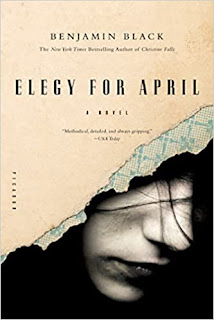Elegy for April (2010), the third Quirke novel by Benjamin Black (John Banville), once again flawlessly blends literary fiction with genre fiction.
Set in Dublin in the 1950s, the story opens with Quirke, who conducts autopsies by profession, drying out in a clinic. His job is not the only thing that drives him to drink. In Christine Falls, the first book in this series, Quirke finally admits that Phoebe, a young woman raised by someone else, is actually his daughter.
Now Phoebe is worried about a friend, Dr. April Latimer, a member of a prominent Irish family, who has not been seen for several days. She worries that something serious may have happened to her, even though April's own family doesn't seem concerned. In fact, they complain when Phoebe tells Quirke, who then tells a friend in the police force. Traces of blood are found in April's flat, suggesting she may have had a miscarriage or an abortion.
No missing-person case is ever formally opened, yet Quirke and Phoebe continue to ask questions, while raising the ire of the Latimer family, more worried about bad publicity than April.
This is hardly a typical murder mystery -- in fact, there is no murder -- yet the tension builds progressively just the same. Some of that tension results from Quirke's relentless struggle with strong drink and his romantic involvement with another of his daughter's friends. There's a hint of comedy, too, mostly involving his purchase of an expensive car even though he lacks both insurance and a driver's license.
Banville once described crime novels as "cheap fiction," implying that he didn't think much of his Benjamin Black novels and wrote them only because they were easy to write and more profitable than his serious fiction. Yet there's nothing cheap about Elegy for April.

No comments:
Post a Comment